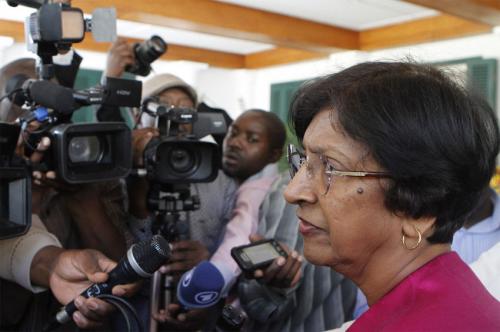UN human rights chief concerned over instability and violations in Guinea-Bissau
The top United Nations human rights official said today she remains concerned over continuing instability in Guinea Bissau, following the coup there last month and reports of human rights violations, including the violent repression of a peaceful demonstration, looting and arbitrary detention of civilians.

UN Human Rights Chief Navi Pillay speaks to the press.
“Anyone who has committed violent or excessive acts must be held accountable,” the UN High Commissioner for Human Rights, Navi Pillay, said in a press release.
She took note of the fact that Guinea-Bissau’s Military Command had on Tuesday handed over power to a transitional civilian Government, following the signing of a political agreement and a transitional political pact.
“I cannot stress enough the importance of full respect for the fundamental human rights of freedom of movement and expression, as well as peaceful association and assembly,” said Ms. Pillay. “The transitional government has a clear duty to ensure that all human rights are fully respected and protected in the country, including the right to security and safety of those who need to return to their homes.”
Soldiers in Guinea-Bissau – a West African country with a history of coups, misrule and political instability since it gained independence from Portugal in 1974 – seized power on 12 April. The coup d’etat came ahead of a presidential run-off election that was slated for 22 April between Carlos Gomes Júnior and a former president, Kumba Yala – and prompted calls from the international community for the return to civilian rule and the restoration of constitutional order.
Last week, the Security Council imposed a travel ban against five military officers involved in the coup and demanded that the Guinea-Bissau military leadership take immediate steps to restore and respect constitutional order.
“I hope that, with the establishment of a transitional government, the right of individuals to free movement will be guaranteed,” Ms. Pillay said. She urged the authorities to withdraw a list reportedly circulated by the Military Command containing the names of 57 people forbidden to leave the country until further notice.
Ms. Pillay also stressed that any restriction on a person’s right to leave the country based on political considerations, rather than legitimate limitations, could be a violation of the International Covenant on Civil and Political Rights, which Guinea-Bissau ratified in December 2010.
According to the Covenant, a person’s right to leave any country, including his or her own, can only be restricted in very specific circumstances.
In addition, the High Commissioner welcomed the release on 27 April of former interim president Raimundo Pereira and Mr. Gomes Júnior, who were arrested and kept in detention in the aftermath of the 12 April coup d’etat. The release was the result of mediation by the Economic Community of West African States.
Source: UN NEWS
- 442 reads
Human Rights
Ringing FOWPAL’s Peace Bell for the World:Nobel Peace Prize Laureates’ Visions and Actions

Protecting the World’s Cultural Diversity for a Sustainable Future

The Peace Bell Resonates at the 27th Eurasian Economic Summit

Declaration of World Day of the Power of Hope Endorsed by People in 158 Nations

Puppet Show I International Friendship Day 2020

